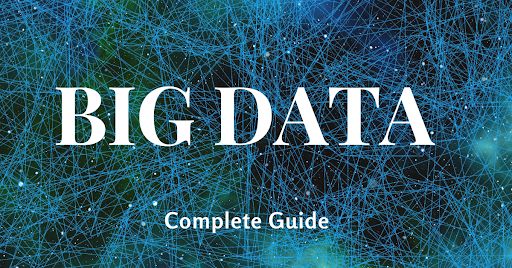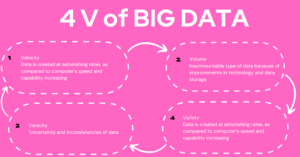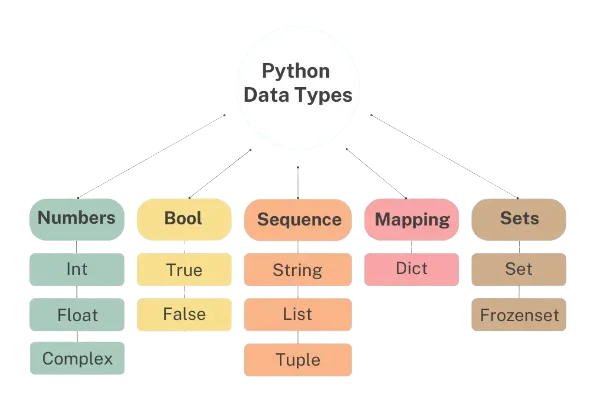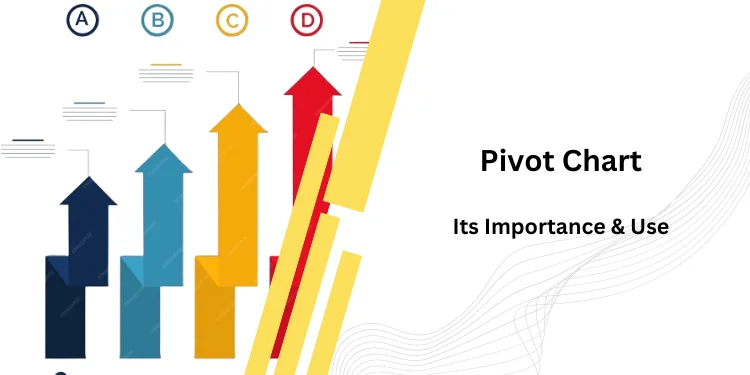Introduction
Don’t know what Big Data is? And want to know everything about Big Data in India? Or want to develop your career in the field of Big Data but don’t know its future scope? Here is the Complete Guide about it.
Big Data may be a term that has been around for a few times now but there’s still confusion about what it actually is. The concept is continuing to evolve and to be reconsidered, as it remains the driving force behind many ongoing waves of digital transformation, including artificial intelligence, data science, and the Internet of Things.
With that in mind, I assumed it had been time to write down a beginner’s guide to what it means in 2017. Thanks to my beginner’s guides to Blockchain and FinTech, this may be jargon-free and aims to illuminate the core concepts and concepts to anyone no matter their background knowledge.
It all starts with the exponential explosion in the amount of knowledge we’ve generated since the dawn of the digital age. This is largely thanks to the increase of computers, the web, and technology capable of capturing information from the important, physical world we sleep in, and converting it to digital data
Have a look at Best Data Science Course Chennai
The average income of a Big Data Developer in India is between 7.4 L.P.A for freshers.
A Career in the field of Big it includes massive growth opportunities where the sky’s the limit. The world is converting into a digital world at a breakneck pace, which means that career opportunities in this field are also going to increase. Most major companies know the importance of this technology as a way to get meaningful insights to make the best possible decisions.
Earlier when the internet was not introduced, information was restricted and more focused to be centralized. The only mediums to get information were newspapers, books, and word of mouth. But now after the invention of the internet and improvements in the field of computer technology (Moore’s Law), information and data are more easily available, and it has become this open system, where information can be transferred to people without any limit. As the internet is becoming more worldwide and accessible, social mobile applications and websites are slowly growing to become platforms for data sharing. Data increases very rapidly and this data is very important for many purposes in any organization but mostly for analytics and making decisions.
In this, huge amounts of data are collected which is used for prediction, analysis, and decision-making. The demand for Big Data engineers increases day by day.
About Big Data
It is huge amounts of data, both structured and unstructured, basically stored in the cloud or in data centers, which are utilized by startups, organizations, companies, and even the government for multiple purposes.
To use data we first have to clean it and then analyze it, forming connections and patterns, trends, and correlations, to develop insights. It’s the term for this type of analysis.
Big Data can collect and store large amounts of data. It allows real-time data flow for fast processing. It provides support to multiple types of data formats, whether it is structured or unstructured, or even semi-structured. It doesn’t matter if it is represented in alphanumeric, alphabetic, numeric, or even visual formats.
Also Visit: the best data science courses in india
It is commonly described by its qualities, which are also known as the 4V of BD.
The 4 V’s
1. Volume
- Insurmountable type of data because of improvements in technology and data storage (cloud storage, better processes, etc.)
2. Velocity
- Data is created at astonishing rates, as compared to the computer’s speed and capability increasing (Moore’s Law)
3. Variety
- A large range of data of multiple formats and types is easily collected, in an era of social media and the internet.
4. Veracity
- ‘Uncertainty and inconsistencies of data (unstructured data — social media, images, video, and many more.)
Career In Big Data Engineering
Based on the Indeed Hiring Lab survey, in January 2019, Big Data or Data Science Career-related postings increased by 256 percent if we compare it to December 2013. The demand for experts in this technology is very high. This demand is going to increase so much in the future too. The growth rate of skilled engineers in this field is a bit slow.
According to the LinkedIn Workforce Report that is Published on 10 Aug 2018, there was a huge increase in demand for Data Scientists between 2015 to 2018.
Reasons for choosing this technology as a career are:
Demand For Big Data Engineers
Most companies want Big Data professionals to handle huge amounts of data and to compete with their competitors. This demand gains momentum day by day.
The shortfall of Big Data Professionals
There is a shortage of Big data engineers as we compare it with the demand for engineers. Hence, the chances of a bright career are higher in this field.
Availability of Various Roles
This job consists of multiple categories of job titles.
It has three core analytical domains:
- Futuristic Analytics
- Rule-based Analytics
- Illustrative Analytics
Flexible roles and responsibilities are offered to them. They can choose from it based on their own preferences and interests.
Related topic: Data Engineering Preparation Strategies
High Rewards
The need for big data engineers is increasing day by day. That is why multiple companies are offering good salary packages to candidates. That’s why a career in this field is meant to be a fruitful one for working professionals searching for significant career progression.
So, you can make the best out of career opportunities in the field of Big Data Engineering.
TOOLS and LANGUAGES used in BIG DATA
There are some of the popular Big Data tools that are commonly associated with its analytics,
Tools
- Hadoop
- Apache Spark
- Apache Hive
- SAS
Most of these tools are open-source frame
works for handling huge data efficiently.
Languages
- R
- Python
- Scala
These languages are very famous in the world of data science and can be used for managing large amounts of data by specific libraries and packages.
Technologies used in Big Data
- Artificial Intelligence
- NoSQL Database
- R Programming
- Data Lakes
- Predictive Analytics
- Apache Spark
- Prescriptive Analytics
- In-memory Database
- Blockchain
- Hadoop Ecosystem
Roles and Responsibilities
The roles and responsibilities of the Big Data engineer who is the one responsible for programming Hadoop applications are:
- Loading the data from disparate data sets.
- High-speed querying
- Propose best practices and standards.
- Being a big data developer, you have to design Hadoop, build Hadoop, install, support, and configure Hadoop.
- He maintains security and data privacy.
- Big Data developer manages and deploys HBase.
- Performs analysis of the huge number of uncovered insights and data stores.
- A Big Data Developer has to perform Hadoop development and Hadoop implementation also.
- He must know how to create scalable and high-performance web services for tracking data.
- Big Data engineers convert complex technical and functional requirements into detailed ones.
- He suggests design changes to various processes and products.
Skills Required to Become Big Data Developer
Some of the most important skills to become a successful Big Data Developer are
- Knowledge of Hadoop-based technologies or Hadoop Frameworks.
- Knowledge of Real-time processing frameworks like Apache Spark.
- SQL-based technologies.
- Knowledge of NoSQL-based technologies such as Cassandra, MongoDB, and HBase.
- Knowledge of any one programming language (Java/Python/R).
- Visualization tools such as Tableau, QlikSense, and QlikView.
- Data Mining tools like KNIME, Rapidminer, etc.
- Knowledge of Machine learning algorithms.
- Knowledge of Statistical & quantitative analysis.
- Freehand runs on Linux, Unix, Solaris, and Microsoft Windows.
- Must have creative thinking ability and problem-solving.
- Must have Business Knowledge.
Roadmap to becoming a Big Data Engineer
1. Build Your Base(SQL, Coding, Linux)
Before going deep into these specifics you must have the basic knowledge.
It can be exciting to start learning some of the concepts and skills that are along the lines of distributed computing systems or streaming. But it is like learning about sentences and words without having knowledge of what letters are.
That’s why you must start with programming, SQL, and the basics of some form of server/Linux.
2. Build Your First Project: Building A Flask API
You will need to use APIs on a daily basis if you want to become a Big data engineer. Either to make the processes automatic or to pull data.
In that way, building an API will be a great first project as in that project you will be forced to use several layers of technology.
You will learn about HTTP requests, coding, ports, and command lines, and if you really want to get into it, you can even work on the cloud by spinning up a virtual machine to run your API on.
3. Get some knowledge About Data Warehousing And Data Pipelines(ETLs, ELTs, and ELs)
When you will have a look at the skill sets of Big Data Engineers, data scientists, and software engineers, you will notice a lot of cross-over.
All three tend to use Python, both Big data engineers and data scientists tend to use SQL(Structured Query Language) most of the time and all three also have some knowledge of Linux.
Data warehouses and data pipelines are concepts that data engineers must know. They are like the bread and butter of any good Big Data Engineer.
4. Develop Your Second Project by Applying Coding And using Data Warehousing
So let’s develop your 2nd project, to solidify the things that you learned. Just focus on implementing these 4 concepts below.
- Scrape an online data source
- Store encrypted data into SFTP
- Create dimensional model
- Get the data from SFTP and load it into Data Warehouse(Don’t think about Workflows just yet)
5. Testing
You must be able to test the project after the completion of the projects.
Learn About Testing
- You may have never learned about testing in your schooling or even in college.
- Now in the world of QA engineers, testing is just part of the CI/CD process.
- You should be capable of writing test cases.
- You must know the difference between integration tests and unit tests.
Learn Airflow And Docker
- You will notice that there are 2 steps 5s. Well, that’s because we are getting to the point where order matters less. Steps 6, 7, 8, and so on. Could probably get a little jumbled but you would be fine at the end.
- At this point, you have a solid base. Different technologies have different learning curves.
- That’s why for this second step 5 it is suggested to learn Airflow + Docker.
6. Cloud and NoSQL
At this point, you have probably had the knowledge to work on Cloud and you may even worked upon NoSQL databases.
7. Streaming And Distributed Systems
There are so many ways to process and manage data in modern technology. More important, using more complex systems like distributed systems or streaming is a lot easier than it has ever been before.
You are able to spin up a fully manag
ed service on GCP or AWS and you’re off to the races. There’s no need to put in place 5 more services just to try to control your streaming setup.
8. Start Studying for Interviews
At some point, you need to go out to companies and try to give an interview.
This article explores everything you’ll need to learn and maps out a path to becoming a Big Data Engineer.
9. Build Your Third Project
At this point in your learning, you must have a good knowledge of skills in this field.
You should know about streaming, programming, distributed systems, APIs, and many more technologies.
So now use all of the knowledge and apply it to build your third project.
10. Learn Enough UI/UX and Dashboarding
Truthfully, UI/UX isn’t always used by a data engineer. However, for some of you out there, you will love to work with it because of its designing dashboards and displaying data.
Generally, there will be a need to at least build a good enough dashboard. So take enough time to learn this skill.
BIG Data Engineer Salary
From the Glassdoor report, the average Big Data Engineers salary in India is around Rs.8,56,643 LPA. Still, their salary completely depends on several factors, including company size, education qualifications, job position, geographical location, and work experience. Big organizations like IBM, Amazon, Accenture, Deloitte, Airbnb, Spotify, Netflix, and Capgemini, usually offer a good package. Also, if you have more experience in Big Data, higher will be your market value in the industries.
Due to the shortage of Big Data engineers as compared with demand, companies are ready to offer a good package to freshers and candidates having some years of experience in Big Data Engineering as well. According to PayScale stats, a Big Data Engineer with less than 1 year of experience is able to achieve an average annual salary of Rs.4,00,676 LPA.
Big Data Engineers with a few years of experience (1-4 years) can expect to earn around Rs.7,37,257 LPA. A Big Data Engineer’s salary rises to Rs.1,218,983 LPA as they advance to the mid-level (with 5-9 years of experience). Big Data Engineers with more than 15 years of expertise can earn more than Rs.1,579,282 LPA.
Future of BIG DATA ENGINEER in India
This technology has gained global attention from its very emergence as a trend. Today, it has become one of the most influential factors in the market. It is correctly said that data and information are the new oil. They can hypothetically be known as a system that acquires crude oil and converts it into fuel. It is a way of collecting, processing, and analyzing data that can be collected from a large range of multiple sources.
Every action demands a pretext – data can justify any action. That is why industries around the globe have included big data analytics in their system.
The Volume of the Big Data Market
From a study by NASSCOM, the Indian Big Data analytics industry is supposed to reach the $16 billion mark by the year 2025. If this prediction comes true, India is going to have a 32% of hold in the global market. Now, everyone knows that big data analytics is one of the biggest players in the Indian analytics sector. The usage of this technology in Indian industries and organizations is not increasing at that speedy rate yet the growth is exponential. The industry is supposed to grow at a CAGR of 26% till the year 2025.
About 90,000 big data analytics professionals are currently employed in Indian companies. And Engineers are still in high demand. There are approximately more than 600 companies operating in the niche of big data analytics products and services and more than 400 companies are startups.
Big Data Influencing Governance
The Indian administration knows the power of this technology and is likely to put it to good use. The best example would be the Comptroller and Auditor General or CAG. They have used the ‘Big data management policy’. The main intention behind this is to better audit the huge amount of data generated by the public of India in the states and the union territories.
Data about electricity usage is also being monitored. The data is compared to historical data in order to analyze.
Digital Space in India
It will be unwise to say that digitization has reached each and every state of India – that is still waiting for a bright future. But we can say that more corners of India have come under the umbrella of this technology in the last few years.
Recently, internet use in India is next to the United States of America. Very soon India is going to have the highest internet-using population and also the highest smartphone-using population. This will change this sector forever. The market is going to expand through the remote corners of India.
Conclusion
Big Data is commonly associated with Data Science, Deep Learning, Machine Learning, and AI. Since these fields need data, this technology will remain in play and it will play a huge role in the betterment of the current models we have now and allow for advancements in the research sector.
It is an ever-growing sector. It is gaining popularity with its potential application in many organizations. Thus, a career in the field is one of the perfect choices for one who is looking for a long and stable career with high rewards.
As data continues to grow and expand, cloud space providers like Microsoft Azure Google Cloud, AWS and are going to rule in storing it. This will increase room for scalability and efficiency for companies. This also means there will be more and more candidates hired to manage this data, which translates to more job opportunities for “Big Data Engineers” to handle the database and huge amounts of data of a company.
As more and more data is generated and picked up, data analysis requires scalable, flexible, and high-performing tools to supply insights in a timely fashion. However, organizations face a growing big data ecosystem where new tools emerge and become outdated very quickly. Therefore, it is often very difficult to stay the pace and choose the proper tools.
DataTrained offers a course step to assist you to solve this challenge. With a broad set of managed services to gather, process, and analyze it, DataTrained makes it easier to create, deploy, and scale big data applications. This enables you to specialize in business problems rather than updating and managing these tools.
We provide many solutions to deal with your big data analytic requirements. Most architecture solutions use multiple AWS tools to create an entire solution. This approach helps meet stringent business requirements in the most cost-optimized, performant, and resilient way possible. The results are a versatile big data architecture that’s ready to scale alongside your business.
Big Data is a game-changer. Many organizations are using more analytics to drive strategic actions and offer a far better customer experience. A slight change in the efficiency or smallest savings can cause an enormous profit, which is why most organizations are moving towards it.

















